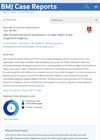 27 citations,
March 1994 in “Harvard Review of Psychiatry”
27 citations,
March 1994 in “Harvard Review of Psychiatry” Behavior therapy and medications, especially clomipramine, can help reduce hair pulling in people with trichotillomania.
 28 citations,
May 2015 in “Addiction Biology”
28 citations,
May 2015 in “Addiction Biology” Prenatal stress changes how male and female rats enjoy rewards differently, linked to sex hormones.
[object Object]  7 citations,
May 2013 in “Optometry and vision science”
7 citations,
May 2013 in “Optometry and vision science” Bimatoprost can help regrow eyelashes in people with trichotillomania.
 January 2012 in “Postgraduate obstetrics & gynecology”
January 2012 in “Postgraduate obstetrics & gynecology” Up to 50% of women may experience significant hair loss by age 50, with various causes and treatments available.
 January 2012 in “Postgraduate obstetrics & gynecology”
January 2012 in “Postgraduate obstetrics & gynecology” Up to half of women by age 50 experience significant hair loss, with various types and treatments available.
 49 citations,
January 2003 in “American Journal of Clinical Dermatology”
49 citations,
January 2003 in “American Journal of Clinical Dermatology” Effective management of children's hair loss involves accurate diagnosis, various treatments, and supportive care.
 27 citations,
January 2017 in “Neuropsychopharmacology”
27 citations,
January 2017 in “Neuropsychopharmacology” The enzyme 5α-reductase is key in causing psychotic-like effects from sleep deprivation.
 40 citations,
April 2018 in “Endocrine”
40 citations,
April 2018 in “Endocrine” PFS and PSSD are similar conditions with persistent sexual dysfunction after stopping medication.
 11 citations,
August 2012 in “Canadian journal of ophthalmology”
11 citations,
August 2012 in “Canadian journal of ophthalmology” Eyelash alopecia areata often goes undiagnosed and can lead to complete eyelash regrowth, especially in younger patients.
 2 citations,
March 2004 in “Reviews in Gynaecological Practice”
2 citations,
March 2004 in “Reviews in Gynaecological Practice” Hormonal changes and psychological issues can cause sexual dysfunction in postmenopausal women. Behavioral therapy is recommended first, with hormone replacement helping some symptoms but not libido. Testosterone can improve libido, but its effects on overall sexual function are unclear. Emotional and relationship issues should be addressed before using medication, and the benefits and risks of testosterone supplementation should be considered.
 1 citations,
May 2017 in “InTech eBooks”
1 citations,
May 2017 in “InTech eBooks” Some natural remedies may help with hair regrowth, but more research is needed to confirm their effectiveness and safety.
 July 2018 in “British Journal of Dermatology”
July 2018 in “British Journal of Dermatology” Mindfulness reduces anxiety and depression in skin disease patients; dermatologists and psychiatrists often lack confidence in treating psychodermatological conditions.
 July 2012 in “Springer eBooks”
July 2012 in “Springer eBooks” The document concludes that proper diagnosis and treatment of nonscarring alopecias can improve quality of life and hair regrowth is possible as the hair follicle remains intact.
 85 citations,
June 2015 in “Scientific Reports”
85 citations,
June 2015 in “Scientific Reports” The study found that diseases can be grouped by symptoms and that the accuracy of predicting disease-related genes varies with the data source.
 1 citations,
October 2013 in “Expert Review of Dermatology”
1 citations,
October 2013 in “Expert Review of Dermatology” Diagnosing alopecia areata is challenging and requires careful examination and various tests to distinguish it from other hair loss types.
 1 citations,
April 2009 in “Cochrane Database of Systematic Reviews”
1 citations,
April 2009 in “Cochrane Database of Systematic Reviews” Review finds no permanent solution for female hair loss.
 1 citations,
January 2009 in “Cochrane Database of Systematic Reviews”
1 citations,
January 2009 in “Cochrane Database of Systematic Reviews” Review determines effective, safe treatments for female hair loss.
 November 2023 in “International Journal For Multidisciplinary Research”
November 2023 in “International Journal For Multidisciplinary Research” Herbal hair oil made with natural ingredients helps reduce hair loss, dandruff, and graying.
[object Object]  December 2020 in “The Journal of Family Practice”
December 2020 in “The Journal of Family Practice” The boy's itchy scalp and hair loss were likely due to head lice treatment.
8 citations,
November 2011 in “Journal of Medical Case Reports” Bupropion may help treat trichotillomania when fluoxetine doesn't work.
24 citations,
June 2013 in “Journal of neuroendocrinology” Neuroactive steroids and the enzyme 5α-reductase might be involved in the development of Tourette's syndrome.
8 citations,
January 2016 in “Case Reports in Psychiatry” Trichotillomania in dementia may be better treated with dopamine blockers like quetiapine than with SSRIs.
 2 citations,
November 2017 in “Case Reports”
2 citations,
November 2017 in “Case Reports” A baby boy's toe was saved from damage caused by hair strangulation by quick surgical treatment.
 January 2009 in “Springer eBooks”
January 2009 in “Springer eBooks” The document concludes that treating skin conditions should include psychological care and a multidisciplinary approach is essential for effective management.
 14 citations,
February 2018 in “Psychoneuroendocrinology”
14 citations,
February 2018 in “Psychoneuroendocrinology” Mice lacking steroid 5α-reductase 2 show less aggression and better impulse control.
 January 2010 in “Elsevier eBooks”
January 2010 in “Elsevier eBooks” The document concludes that different types of hair loss have specific treatments, and early diagnosis is crucial for preventing permanent hair loss.
 10 citations,
June 2000 in “Primary Care”
10 citations,
June 2000 in “Primary Care” The document explains different hair loss types and treatments, emphasizing diagnosis through examination and tests, and specific treatments for each condition.
 5 citations,
February 2010 in “Expert Review of Dermatology”
5 citations,
February 2010 in “Expert Review of Dermatology” Treating both the mind and skin together, especially by managing stress, can greatly improve outcomes for skin disorders linked to psychological issues.
8 citations,
February 2021 in “Comprehensive psychiatry” People with trichotillomania or skin picking disorder generally sleep worse than those without these conditions.
 5 citations,
November 2021 in “Skin appendage disorders”
5 citations,
November 2021 in “Skin appendage disorders” Hair loss can cause stress and mental health issues, so treatments should address both the physical and psychological aspects, involving a team of dermatologists, psychologists, and hair specialists.


























